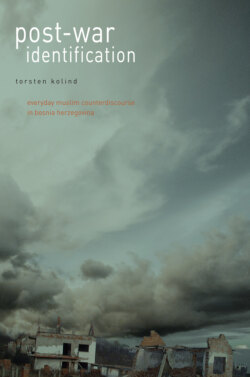Читать книгу Post-War Identification - Torsten Kolind - Страница 49
На сайте Литреса книга снята с продажи.
Amputation: hero-tales
ОглавлениеThe last example relates to how remembering experiences can function as a way of recovering agency. I call the agency-generating stories told in Stolac hero-tales. The point is that when telling these rather tragic stories, the speaker introduces a little twist, so that he becomes an acting subject and not just an object acted upon by others. Hero-tales can be stories about escapes, hiding food in prison camp, dressing up like a woman and thereby tricking the Croat soldiers when they came to fetch the Muslim men, and so on.
A transcription of an interview can never convey the atmosphere in which it was conducted. This is a great disadvantage in this excerpt from an interview with Muhamed, as the atmosphere was full of humour and liveliness, and Muhamed’s story was accompanied by vibrant gestures.
Muhamed: Did you arrive from Denmark by plane?
TK: Yes.
Muhamed: From Mostar to Sarajevo, Mostar to Sarajevo over the mountains on foot! Yes on foot…And we had noting to eat, no water, there was nothing.
Muhamed’s wife: It was war.
Muhamed: Over the mountains. I had boots. My wife had only shoes. And there were a lot of stones, and they hurt your feet.
TK: How many days?
Muhamed: Four days and four nights. Halfway through Bosnia on foot, and we returned to Konjic on foot. And we returned to the house in the evening, washed a little … [and then he uses body language to show how they then made love]. We were not tired [laughing}, but after making love, we were tired [laughing]. […]
TK: When was that?
Muhamed: In 1994.
Wife: Tell him about when we were married.
Muhamed: The wedding was at ten o’clock in the morning … No wedding outfit … [only] uniform…we washed ourselves…My wife had smartened herself up you know, and all the time shelling, snipers; take cover. I said to my wife…it is normal at a wedding that you shoot in the air. I said ‘Here is a gun so we can shoot, for real.’ [Laughs]. But the shells were falling so we could not shoot [What he means was that they did not need to shoot, because all the shells were a salute in themselves]. Then we were in the basement, only the four of us. Me, my wife and the best men (kum i kuma). Nobody else. 10 o’clock in the morning. We signed the papers and then we were ready to go to another house and…you know [laughs.] And we had no wedding ring. My wife made pita [traditional dish] out of tinned food, then we had half a litre of sliva [plum brandy], and at 4 o’clock in the afternoon I had to go…to the front…yes…that’s how it was…love.
The unmaking of the world is not ‘only’ about how the everyday world is destroyed and values and social relations damaged. It is also about how communication of the violent experiences is itself problematic. People want to forget but cannot do so because the memories keep surfacing. And people want to remember and talk about it all, but cannot do so because they are not able to understand what happened, and when they try words and categories do not suffice, so new but still insufficient ones have to be invented: the amputated telling from the world’s unmaking.
